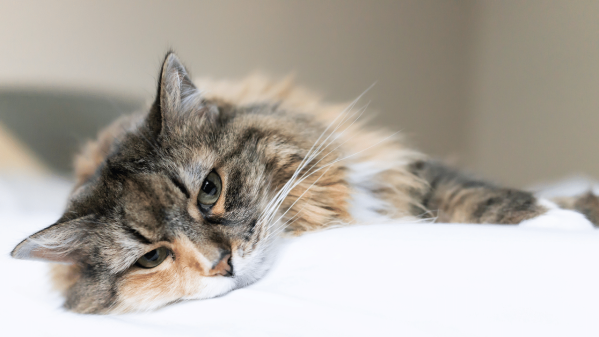It can be terrifying to see our cats suffering or in pain, but it’s extra scary when we don’t know what the cause of their discomfort is. Sometimes cats will start exhibiting strange symptoms—this may include twitching, convulsions, disorientation, or even violent tremors or collapsing. When this happens, we may not know what this means, why it’s happening, or how serious these symptoms may actually be. These could be symptoms of seizures in cats, and if your cat is experiencing them, it’s important to talk to a veterinarian immediately.
In this article, we'll discuss what cat seizures are, what the difference between seizures and epilepsy are, which cats are most prone to seizures, potential cat seizure treatments, and how to help your cat during a seizure episode.
What are cat seizures and what causes them?
Similar to seizures in humans, we understand that seizures in cats come in different forms, for different reasons, and with different levels of severity and concern.
Seizures are a condition that affects the nervous system of cats. When a series of seizures occur, it's called epilepsy. As with humans, the causes of seizures in cats can vary, but most seizures are caused by either an inherited disorder or a brain abnormality.
When a seizure occurs, there is a temporary disturbance in the cat’s brain which causes involuntary muscle contractions. Although cats can have seizures, it is less common than in dogs. Only about 2% of cats are affected by seizures. If you believe your cat has had a seizure, reach out to your veterinarian or a Pawp Professional to help discuss the next steps in identifying and preventing another seizure episode.
Inherited
An inherited seizure disorder is much less common in cats than in dogs. The cause is unknown and is termed idiopathic epilepsy.
Brain abnormalities
An abnormality in the brain can lead to seizure activity and is the most common cause of seizures in cats. A tumor, lesion, head trauma, or a congenital defect can cause seizures to develop.
Toxins and other disorders
Certain chemicals and ingredients found in common substances can cause a seizure to occur. Young kittens or cats with diabetes may have a seizure from an unbalanced blood glucose. For this reason, it's very important to take your cat to a veterinarian the first time a seizure occurs. Your veterinarian will perform an examination and blood work to rule out toxins and consider your cat to have an inherited disorder or a brain abnormality.
Signs your cat is having a seizure
There are different stages of seizure activity in cats. Your cat may or may not present with the beginning signs of a seizure, especially if the seizure is caused by a toxin.
For general seizure activity, there is a pre-ictal phase, ictal phase, and post-ictal phase. In a full-blown seizure episode, your cat will lose consciousness, violently shake and thrash, may or may not lose control of their urine and feces, turn their head to the side, and paddle with their feet. This type of seizure is called a Grand Mal seizure and is categorized by these signs for up to five minutes.
When a Grand Mal seizure lasts longer than five minutes, your cat is in status epilepticus. During this phase, severe brain damage can occur.
The signs of seizure activity can be thought to be abnormal activity in the pre-ictal phase. Your cat may be restless, seek you out to be close, vocalize, shake, hide, or seem nervous. Your cat may experience this behavior for a few seconds to several minutes.
The ictal phase involves changes in mentation—appearing dazed or confused, staring aimlessly at a wall or into space, licking their lips, or becoming unconscious. This phase may or may not lead into a Grand Mal seizure.
The post-ictal phase is the time after the seizure activity has occurred. It may take a few minutes to hours and your cat may be disoriented, confused, pace back and forth, have temporary blindness, and become very restless.
Since there are so many different signs of seizure activity, how long the seizure may last, and how long it takes to recover, it's crucial to try and remember what occurred during the first seizure episode. Once a seizure has occurred, we recommend creating a seizure log and listing the following information to the best of your knowledge.
What was your cat doing before the seizure occurred?
What happened during the seizure?
How long was the seizure episode?
How long did it take to recover?
Present this information to your veterinarian to help them diagnose the cause of the seizure and determine if your cat needs seizure control medication.
Which cats are more prone to seizures?
There is no set breed of cat that is more prone to seizures, but seizures are more common in middle-aged and senior cats. Seizure disorders in older cats are usually associated with an underlying health condition. A study that was published in the Journal of Veterinary Internal Medicine determined that the highest percentage of cats diagnosed with a seizure disorder were crossbreeds.
What to do if your cat is having a seizure
Try to remain calm, and if you can safely hold your cat, wrap a blanket around them so they do not hurt themselves from thrashing and shaking. If this ins't an option, protect their head with a blanket or pillow to help prevent head trauma. Be extremely cautious around the mouth since they will often bite down during a seizure episode. Even if they bite down on their tongue, do not try to open their mouth.
Talk to a vet about your cat's seizures
If your cat has a seizure and lasts for a few seconds to a few minutes, it's important to have them examined immediately to determine if the seizure is caused by an underlying illness or toxin or is idiopathic. If it lasts more than five minutes, you need to go directly to an ER.
After your veterinarian has cleared your cat as being healthy with no organ abnormalities, they may advise you to monitor and log the seizure activity and not start any medications yet. It may take some time to determine what caused the seizure since many tests are required to rule out the underlying cause.
Your veterinarian may also refer you to a veterinary neurologist that can perform diagnostic testing including a myelogram, CT, or MRI.

Reviewed and fact-checked by
Mika, RVT at Pawp
